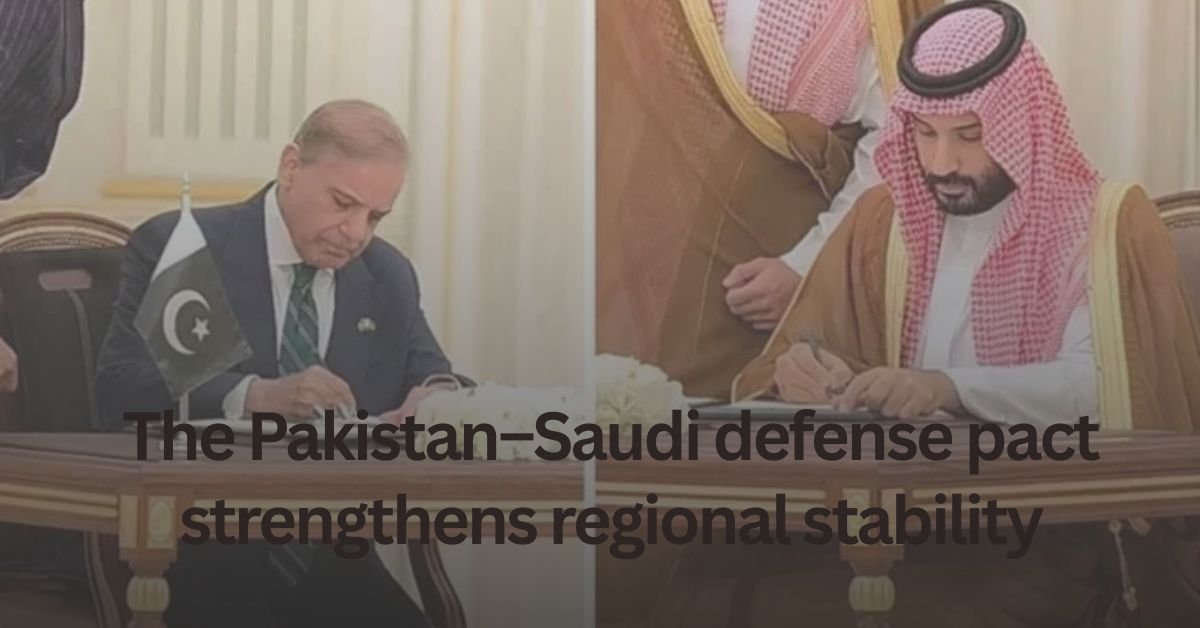Meta Title: Pakistan-Saudi Defense Pact: Stability, Unity & Deterrence
Explore the Strategic Mutual Defense Agreement between Pakistan and Saudi Arabia. this turning point raise regional stability, strengthens joint suppression, and promotes Muslim unity.
The signing of the Strategic Mutual Defense Agreement (SMDA) between Pakistan and Saudi Arabia for this defence of the region this month marks more than just a diplomatic ceremony—it’s a turning moment with profound implications for regional stability and the future of Muslim unity.
By formally set out that aggression against one country will be considered aggression against the other country, this pact explains their historical relationship into a proper framework of joint intimidation. This isn’t just a political point; it’s a strategic realignment that demands attention from global lagislators and regional powers alike.
I. Decades of Friendship, Now a Formal Alliance
The deep bonds between Islamabad capital of pakistan and Riyadh capital of saudi arabia have long cut accross ordinary diplomacy, bonded in the trust, history, and a shared sense of responsibility for the Muslim world between both of them.
A. An determined Partnership
For decades, this relationship has been characterized by mutual support:
Economic Assistance:
Saudi Arabia has consistently supported Pakistan in times of economic hardship, providing vital oil facilities on lower of the payments and generous financial assistance.
Military Cooperation:
Pakistan has provided extensive military expertise, including training of the Saudi officers and deploying personnel to safeguard the security of the kingdom of saudi arabia. Since 1967, Pakistan has trained over 8,200 Saudi armed force in saudia.
The new Strategic Mutual Defense Agreemen between these countriest formalizes and enhances this cooperation, creating a binding security assurance.
B. Core Areas of Cooperation
The pact focuses on this as squarely on conventional cooperation and bolstering joint capabilities.
Key areas for implementation of this moving forward include:
Joint Training / Exercises of the forces
Intelligence Sharing between them
Maritime Cooperation
Defense Co-production and Technology Transfers between them
Investment in the military of the Pakistan’s Military-Industrial Base
II. The Power of Joint Deterrence
The central tenet of the SMDA—collective defense—has significant geopolitical relevance for both of these of the in the nations, especially amid heightened Gulf Security concerns.
A. The Strategic Ambiguity of Nuclear Status
The pact has sparkedin the speculation in Western media regarding a “nuclear dimension”—the notion of Pakistan is to extending a nuclear umbrella with the Saudi Arabia.
Fact Check:
The strategic military agreement is explicitly not a nuclear-sharing agreement and both are committed to the with non-proliferation norms. However, Pakistan’s nuclear status lends the agreement an unavoidable strategic weight. The pledge to employ with the “all military means” introduces a measure of ambiguity that could act as a powerful deterrent against aggression.
B. Bolstering Geopolitical Clout
For both signatories of saudia and pakisatan, the benefits are clear:
increasing political and bargaining of the power in international platforms.Secures the partnership between them of one of the largest and most capable Muslim militaries.
Signals that Pakistan remains indispensable in the security calculus of the Muslim world.Reinforces its Deterrent Posture at a time of rising insecurity, diversifying its security portfolio.powerful commitment from a leading Muslim state ssaudia and pakistan against External Aggression.
III. A New Era for Muslim World Security
This Strategic Mutual Defense Agreement of these countries must also be viewed in the as a critical step in a broader to the continuum towards Muslim unity and the potential creation of a Muslim Security Framework.
A. The Spirit of Lahore
The intellectual foundation for this collective action between them was laid long ago at the 1974 Islamic Summit in Lahore, which brought together the leaders of the Islamic world in an unprecedented demonstration of solidarity in them . The Pakistan-Saudi Defense Pact translates that spirit into a modern, formal security framework.
B. Shaping a Regional Security System
The leadership shown by HRH Mohammed bin Salman of saudia and Pakistan’s armed forces, under the command of Field Marshal Asim Munir, has been instrumental in this important movement. Their foresight and military diplomacy have led to a pact that aims to create a regional security system free from foreign interference in the region.
A Positive Sign:
importantly, Iran has accepted the agreement, framing it as a potential starting point for wider collective security of islamic countries in the region.
Future Vision:
If carefully brought up, this cooperation could begin into a structure that brings together more islamic countries under a pillar of the mutual security.
The future direction: wisdom and Prosperity
For Pakistan, this agreement is an opportunity to make its role stronger in the region as a trustworthy, reliable, and sovereign partner of the others. Moving forward requires a cautious and the clear approach, prioritizing:
Defense Industrial Collaboration;
Focusing on defense in co-production and technology of the transfers.
Balancing Solidarity with wisdom:
Ensuring the act is held in a manner that enhances security benefits of the countries in them while navigating difficult regional dynamics.
The Pakistan-Saudi defense pact has very important role to mark the initiation of a new era in Muslim-world security, one where Pakistan plays a very important role in promoting peace and stability of the region.
